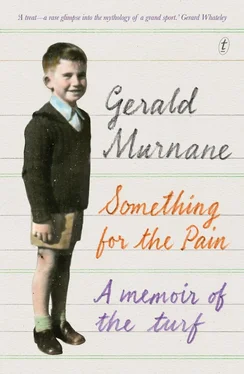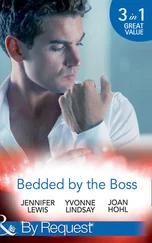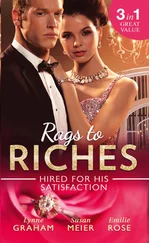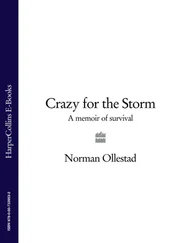The previous paragraph might well have been a suitable ending for this section, but I can end it perhaps even more aptly by reporting my sister’s reaction when she first met Teddy Ettershank. She was not quite one year of age and was perched in her mother’s arms when the diminutive egg-bald man strode into our kitchen in Pascoe Vale, stepped up close to her, and made what he surely intended to be a friendly noise. My sister turned her face to her mother’s shoulder and burst into tears.
RACE MEETINGS OF fifty and more years ago attracted huge crowds by comparison with today, and yet the facilities in the public areas, as distinct from the members’ areas, would be considered intolerable nowadays. My father and I travelled by train to the Derby Day meeting at Flemington in November 1956. We stood and swayed among the press of passengers in one of the dozens of special race trains running express from Spencer Street Station to the platform beside the racecourse. The weather was fine and warm, and the betting ring and its surrounds were densely crowded all day, except for the few minutes when a race was being run. Surely there were seats provided somewhere but, as I recall it, my father and I spent most of the day standing in the ring or edging our way with thousands of others to and from the lawn before and after each race. This was in the public enclosure, as it was called. We understood that things were different in the members’ enclosure. We glimpsed some of the members on the far side of the so-called rails, where leading bookmakers took bets from both us, the paying public, and them, the members of the Victoria Racing Club, all of them men and many wearing the top hats and morning dress that was traditional on Derby Day. The members’ enclosure was shaded by elm trees, with plentiful seating beneath, and overhung by the massive members’ grandstand, with spacious dining rooms and bars on its ground floor. We tens of thousands who had paid the equivalent of about seventy-five dollars in today’s currency had only a small grandstand that was full long before each race. My father was one of the many who liked to stay in the ring until the late money arrived, and so we watched each race from the lawn, which was not even sloped or elevated and from which most spectators saw nothing of the horses until they rushed past in the straight. The weather on Derby Day in 1956, as I’ve reported, was fine and warm. If rain had fallen, a few of us might have found shelter in the public bars or in the lee of the totalisator building, but the rest of us could have done no more than turn our backs to the weather like sheep or cattle.
My father never read a form guide or a race book. He learned all that he needed to know by watching the betting or listening to smart men, as he called them. His philosophy of racing, so to call it, had been developed on a single afternoon at the Warrnambool racecourse, which is about halfway between his birthplace at Allansford and his grave in the Warrnambool Cemetery, beside the estuary of the Hopkins River.
Reginald Thomas Murnane died in his fifties more than fifty years ago, and I often wish I had questioned him more about his racing exploits while I had the opportunity. He was a talkative man and he would willingly have told me about plunges planned months in advance, secret track gallops, certainties beaten by the narrowest of margins, or bookmakers asking for time to pay up, but I recall only brief anecdotes and off-hand references.
How old was he when he went to the Warrnambool races for the first time? I estimate the date to have been in the early 1920s, when he was about twenty. He was the eldest son of a prosperous dairy farmer and might have become a farmer himself, but his life changed when his appendix burst at the age of sixteen. His family expected him to die, yet he survived thanks to a remarkable medico at the Warrnambool Hospital, a man named Bannon, who spent hours cleaning out of my father’s guts every last skerrick of the muck that might have led to fatal septicaemia if it had remained inside him after his surgical procedure. My father spent a year recuperating, and during that time he visited cousins in New South Wales and Queensland, and developed his lifelong love of travel and changes of scenery. Perhaps he went to his first race meetings during that time, when he was far away from his father, whom I remember from my childhood as the unsmiling tyrant of the household. All I learned from my father are a few details of the fateful Warrnambool meeting mentioned already.
My father would have known numerous locals at the Warrnambool races, but the famous steeplechase meeting in May drew owners and trainers and punters and bookmakers from Melbourne and elsewhere. These would have been unknown to my father, and yet, early during the meeting he identified a group who knew what they were about. Or, did he identify more than one such group? He stood unobtrusively near them. He followed them. He backed what they backed. He won money, and more money, and here I must digress.
Whether it was the result of that first wondrous day at Warrnambool races or whether it came from some natural recklessness in him, my father could never bet responsibly, to use that sanctimonious expression. He handed over to my mother every fortnight the modest salary cheque that he earned as a low-level public servant, and he lived frugally, neither drinking nor smoking. When he bet, however, he seemed to forget the monetary scale that governed his everyday affairs. He seemed to think he was an owner or a trainer or one of his revered smart men. If someone he respected tipped him a horse, my father would bet on it, at the very least, a sum equal to half his weekly earnings. If he did not have such a sum at hand, he usually knew an illegal off-course bookmaker who would let him bet on credit. In his bachelor years (he did not marry until he was thirty-four), he won many a time a sum that might have bought a block of land in an outer suburb or even a single-fronted cottage in a working-class inner suburb. And yet, his and my mother’s first home after their marriage was a room with a double bed in a boarding house in Brunswick. He wore a bespoke suit and a gold-plated Rolex Prince watch and one or another of a collection of grey felt hats with peacock feathers in their bands, but he died with no assets to speak of and owing many thousands of dollars in today’s currency to his brothers and to who knows how many bookmakers that he welshed on, to put it bluntly.
The first race on Derby Day in 1956 was the Wakeful Stakes for three-years-old fillies. It was contested by better-than-average fillies being prepared, most of them, for the Oaks Stakes on the following Thursday. The favourite, at very short odds, was In Harmony (Green and yellow hoops), trained locally by Stan Murphy. My father and I had only just arrived in the betting ring when he grabbed my elbow and hissed at me to follow a certain man who had just brushed past us and to learn which horse the man was going to back with the several ten-pound notes that he held in his hand. If the reader wonders why my father himself did not follow the man, then the reader has still not understood my attempts to describe how it was in the Great Age of Racing, which had begun nearly a century before the day when my father told me to spy on Alf Sands and which, had we only known it, was about to end within the next decade. My father was vain and had an inflated sense of his own place in the world, but at the races he truly did have the appearance of a smart man, of someone in the know . Even I, still a schoolboy, knew that if my father had followed Alf Sands, then Alf, being at least as smart as my father, would have got wind of it and would have put his money into his pocket and lost himself in the crowd.
Читать дальше












